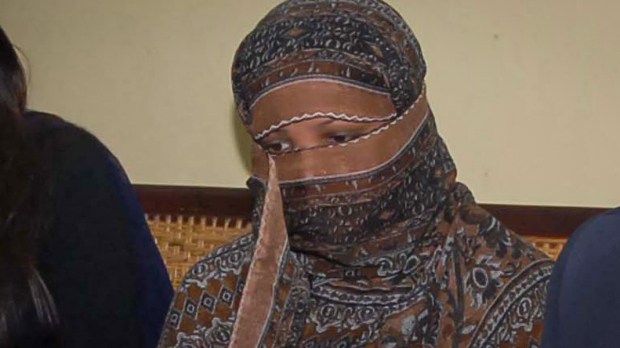Asia Bibi, the Pakistani woman who is perhaps the best known figure embroiled in a controversial law that punishes religious blasphemy, has been nominated for the European Parliament’s Sakharov Prize for Freedom of Thought. The prize is awarded to individuals who have made an exceptional contribution to the fight for human rights across the globe, drawing attention to human rights violations as well as supporting the laureates and their cause.
Bibi, her husband and their five children were the only Christians in their village in Punjab, about 30 miles from Lahore. Working as a farmhand, she had been repeatedly urged by her fellow workers to convert to Islam. In 2009, she was involved in an argument with a group of Muslim women with whom she had been harvesting berries. The other women grew angry with her for drinking water from the same cup as them, saying that as a Christian, she was “unclean.”
According to Bibi, when they made derogatory statements about Christianity, she responded, “I believe in my religion and in Jesus Christ, who died on the cross for the sins of mankind. What did your Prophet Muhammad ever do to save mankind?”
She was subsequently accused of insulting Muhammad, a charge she denies, and was arrested and imprisoned. In 2010, she was convicted of blasphemy by a Pakistani court and received a sentence of death by hanging. She became the first woman condemned to death in Pakistan on blasphemy charges.
Pakistan is one of many countries that have so-called “blasphemy laws” on the books. Offenses could range from insulting Islam’s founder to desecrating its holy book, the Quran.
Pakistan’s Supreme Court has suspended her death sentence for the duration of her appeals process, but that process is in limbo.
Peter Van Dalen, a member of the European Conservatives and Reformists Group in the European Parliament, nominated Bibi for the prize.
“Asia Bibi’s case is of symbolic importance for others who have endured simply for expressing freedom of religion,” he said.
“In her we see the situation of the whole Christian community,” Kaleem Dean, a Pakistani analyst, told Fides news agency. Her case is tragically indicative of the insecurity faced by all minorities when it comes to their fundamental human rights.”
Dean charged that in failing to address the abuses that come about as a result of the laws, the government of Pakistan is “burying its head in the sand in order not to hear the anguished cries of minority communities.” Charges of blasphemy are “an instrument of what has become state oppression against minorities. Governors should have the courage and vision to reform the blasphemy law,” Dean said.
The Sakharov Prize, begun in 1988, is named in honor of Russian physicist Andrei Dmitrievich Sakharov (1921-1989), who won the Nobel Peace Prize in 1975. He first came to prominence as the father of the hydrogen bomb in the USSR. Concerned at the implications his work had for the future of mankind, he sought to raise awareness of the dangers of the nuclear arms race. In the USSR, he was seen as a subversive dissident. In 1970, he founded a committee to defend human rights and victims of political trials. Despite increasing pressure from the government, Sakharov not only sought the release of dissidents in his country but became one of the regime’s most courageous critics, embodying the crusade against the denial of fundamental rights. To limit his contacts with foreigners, Sakharov was exiled to the city of Gorky, which was closed to foreigners to safeguard the security of Soviet military research and production facilities.
Last year’s Sakharov Prize went to Nadia Murad Basee Taha and Lamiya Aji Bashar, who are survivors of sexual enslavement by Islamic State of Iraq and Syria. The two have become spokespersons for women afflicted by ISIS’s campaign of sexual violence. They are public advocates for the Yazidi community in Iraq, a religious minority that has been the subject of a genocidal campaign by IS militants.
In 2013, the Sakharov Prize went to Malala Yousafzai, who was shot in the face by the Taliban in Pakistan’s Swat Valley in 2012. The Taliban wanted to stop her and other girls from getting an education. She won the Nobel Peace Prize in 2014.
Along with Bibi, this year’s nominees include Aura Lolita Chavez Ixcaquic, a Guatemalan human rights campaigner, Selahattin Demirtas and Figen Yuksekdag, co-presidents of the Kurdish Peoples’ Democratic Party (HDP) in Turkey; groups and individuals representing the democratic opposition in Venezuela; Dawit Isaak, a Swedish-Eritrean playwright, arrested in 2001 by the Eritrean authorities, and Pierre Claver Mbonospa, a Burundian human rights activist.
The winner is usually announced in October, and the award ceremony takes place in December in Strasbourg, France.

